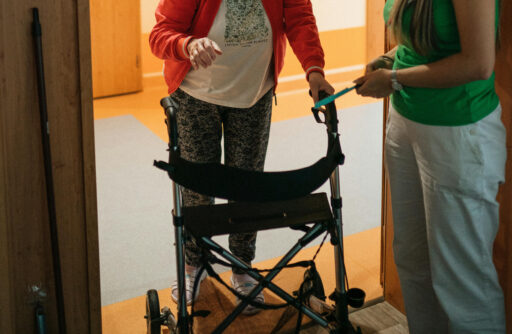Case of the Month
The Case
The College received a complaint about a physiotherapist who was providing care to a patient recovering from a fracture.
At the time, the patient was using a wheelchair but could get around with supervision using a walker. The patient’s goal was to once again walk independently.
Speaking to an aide, the patient expressed frustration that they believed the physiotherapist hadn’t developed a plan to help them reach their goal.
The aide met with the PT to discuss the patient’s treatment plan, telling the PT they were concerned it hadn’t been updated despite the patient recently being reassessed.
The physiotherapist said because the patient lived alone, pushing them to do more strenuous exercise when no one else was around could cause them to fall or seriously hurt themselves.
The PT said they would follow up with the aide but never did.
A review of the patient’s records found they were incomplete and lacked documentation of key events and conversations. The physiotherapist said this was because their heavy caseload didn’t allow time for proper charting.
The Standards
The Collaborative Care Standard requires physiotherapists to collaborate with patients and others involved in their care when it’s relevant to a patient’s treatment plan.
A physiotherapist must work with a patient to create a plan of care that addresses their needs and goals, and help the patient understand their own role in the care plan.
While the PT appeared to have spoken with family members and other healthcare providers about the patient’s care, they did not document these conversations in the patient record.
A conservative treatment plan may have been right for the patient, but the PT’s assessment notes lacked the detail and specificity to justify that plan, falling short of the requirements of the Record Keeping Standard.
According to the standard, information in clinical records must support a physiotherapist’s rationale for the care they provide.
Clinical records must contain objective data, evidence and outcome measures whenever possible and appropriate, and must include enough detail that another healthcare provider could assume care of the patient or follow the plan of care.
In this case, the incomplete records would not have allowed another practitioner to manage the patient’s care.
Importantly, the patient’s record included little documentation that the PT believed the patient was at high risk of falling. It also lacked details about how the PT could work with other care providers to mitigate that risk.
In situations where physiotherapists are overworked, it’s essential they reach out for assistance or accommodation to ensure important aspects of patient care, like record keeping, aren’t neglected. Regardless of the work circumstances, PTs are still responsible for meeting the standards.
The Outcome
The physiotherapist was required to complete a Specified Continuing Education or Remediation Program (SCERP) focused on record keeping and patient/interprofessional communication.
Information about the SCERP will be posted on the Public Register, and the PT is responsible for covering the program’s cost.
Details of this case have been changed to maintain anonymity.
Record Keeping Standard
Collaborative Care Standard











You are never to busy to complete charting. And it is one good way to « protect » your ??s.